This text explores the art of preparing perfect BBQ ribs in the oven, emphasizing the crucial role of marinades. It highlights that marinades tenderize meat through acid (lemon juice, vinegar) and salt, balancing flavor and juiciness. The ideal cut for ribs is recommended as baby back or spare rib, offering both tenderness and versatility. Creating a balanced marinade involves combining acids, sweeteners, and spices like paprika, garlic powder, and chili powder. Choosing between dry brining (for low-and-slow cooking) and wet marination (for shorter, higher-temp cooks) is discussed, with wet marinades suited for oven cooking. The one-pot marinade technique is introduced as a time-saver, combining preparation and cooking. Baking ribs in the oven offers consistent results, allowing marinades to penetrate deeply while keeping them juicy and tender. Leftover ribs are best stored in airtight containers for up to 3-4 days, reheatable at low temperatures or with quick baking for a crispy exterior.
Discover the secrets to achieving mouthwatering BBQ ribs in oven recipes with our comprehensive guide. Learn how marinades work scientifically to tenderize and flavor your ribs, from understanding basic chemistry to advanced techniques like dry brining. We’ll walk you through choosing the best rib cuts for oven cooking, crafting a flavor profile with essential ingredients, and optimizing time-saving one-pot marinades. Plus, find out the ideal methods for grilling or baking, along with storage tips for leftover delights.
- Understanding the Science Behind Marinades for Ribs
- Choosing the Right Cuts of Ribs for Oven Cooking
- The Essential Ingredients in a Flavorful BBQ Ribs Marinade
- Techniques to Enhance Ribs Marination: Dry Brining vs Wet Marinade
- Creating a Time-Saving One-Pot Marinade
- Grilling vs Baking: The Best Method for Tender, Flavored Ribs
- Tips for Storage and Reheating Leftover BBQ Ribs
Understanding the Science Behind Marinades for Ribs
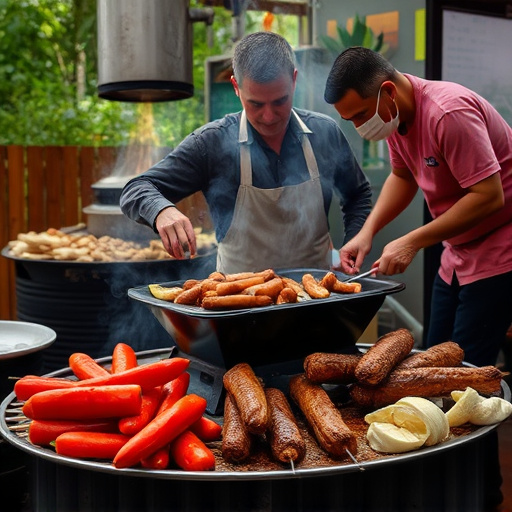
Marinades are a game-changer when it comes to enhancing the flavor and tenderizing your barbecue ribs. The science behind marinades involves a chemical reaction between the acid in the marinade (like lemon juice or vinegar) and proteins in the meat, helping to break down tough connective tissues. This process, known as protein denaturation, results in more tender, juicy ribs. Additionally, the salt in marinades draws out moisture, creating a delicious contrast in textures.
When preparing your BBQ ribs in the oven recipe, allow enough time for the marinade to penetrate the meat. A good rule of thumb is to marinate for at least 2 hours, but overnight or even longer can yield even better results, especially with tougher cuts of pork ribs. The key is to be patient and let the flavors infuse deeply into the rib meat for a truly mouthwatering barbecue experience.
Choosing the Right Cuts of Ribs for Oven Cooking
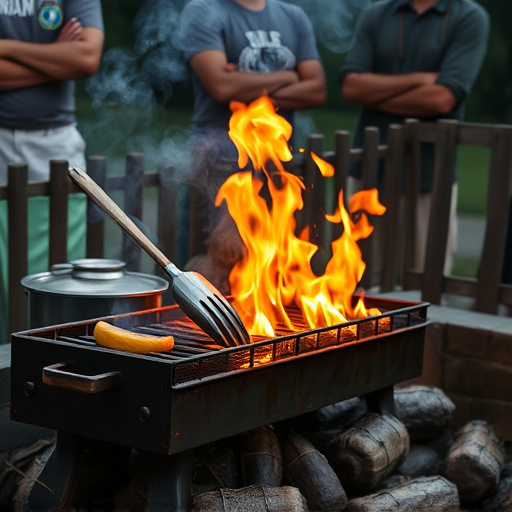
When it comes to preparing BBQ ribs in the oven, selecting the right cut is key to achieving that tender, succulent result. Opt for ribs with good marbling—the fat streaks running through the meat—as this helps keep them moist and juicy during the cooking process. Look for cuts like baby back or spare rib, which are popular choices for oven-roasted ribs due to their balance of meaty sections and milder flavor profiles. These cuts also offer a nice combination of bone-in and boneless options, allowing you to choose based on your preferred texture and presentation.
Remember, the right cut will ensure your BBQ ribs in the oven recipe turns out perfectly. By selecting ribs with good marbling and considering the popular choices like baby back or spare rib, you’re setting yourself up for a delicious barbecue experience that’s sure to impress.
The Essential Ingredients in a Flavorful BBQ Ribs Marinade
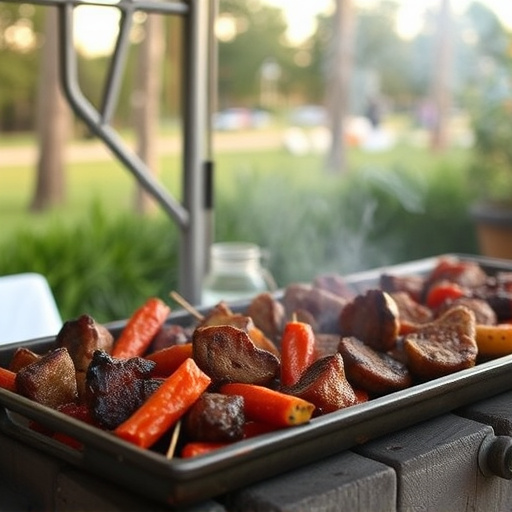
When crafting a marinade for the perfect BBQ ribs, understanding the key ingredients is essential. The foundation of a flavorful marinade starts with a combination of acids and sweet or savory flavors. Vinegar or citrus juices like lemon or lime juice act as natural tenderizers, helping to break down the tough collagen in ribs while adding a tangy zing.
In terms of sweetness, brown sugar or molasses are popular choices. They not only enhance the caramelization process but also contribute to the depth of flavor. Additionally, spices play a vital role, with paprika, garlic powder, black pepper, and chili powder adding warmth and heat. These ingredients, when combined in the right proportions, create a mouthwatering marinade that will transform your BBQ ribs into a tender, juicy delight, perfect for an oven-roasted BBQ ribs recipe.
Techniques to Enhance Ribs Marination: Dry Brining vs Wet Marinade
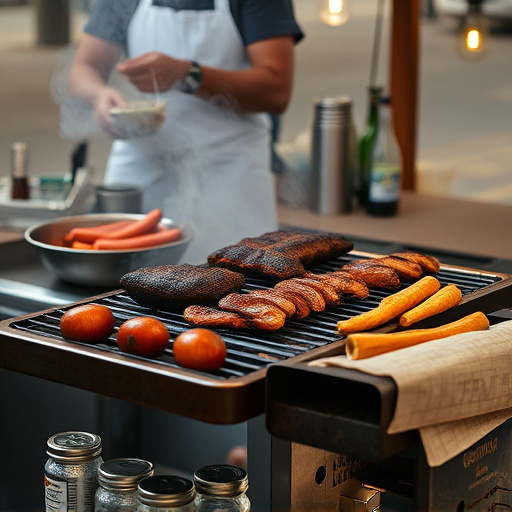
When it comes to enhancing the taste of your BBQ ribs, choosing between dry brining and wet marination is a crucial decision. Both methods have their unique advantages and can significantly impact the final flavor. Dry brining involves coating the ribs in a mixture of salt and spices, creating a porous layer that penetrates into the meat over time. This technique is ideal for ribs cooked low and slow, allowing the seasonings to deeply infuse. It results in incredibly tender, flavorful ribs with a robust spice profile.
On the other hand, wet marinades are made with a combination of liquid ingredients like soy sauce, vinegar, or fruit juices, which help break down the meat’s fibers. Wet marination is best suited for ribs cooked at higher temperatures for shorter durations. The liquid not only tenderizes the ribs but also adds moisture, preventing them from drying out during the barbecue process. For an oven-roasted BBQ ribs recipe, a wet marinade can be particularly effective, ensuring juicy, succulent results every time.
Creating a Time-Saving One-Pot Marinade
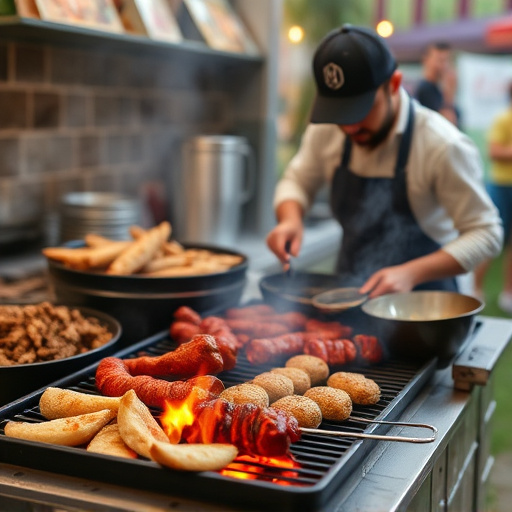
Creating a Time-Saving One-Pot Marinade for BBQ Ribs in the Oven
One of the most efficient ways to prepare mouthwatering barbecue ribs is by combining marinating and baking in one convenient step. This time-saving method, often referred to as a one-pot marinade, not only simplifies your cooking process but also ensures consistent flavor penetration. By combining all ingredients in a single container, you can easily toss your ribs directly into the oven after marinating, eliminating the need for separate steps and ensuring a hassle-free dining experience.
This approach allows for versatile seasoning blends, from classic BBQ to sweet chili, catering to various tastes. The key lies in balancing acidic components like vinegar or citrus with rich, flavorful ingredients such as brown sugar or soy sauce. This balance helps tenderize the ribs while infusing them with a deep, savory taste. With practice, you’ll master the art of crafting one-pot marinades tailored to your preferred BBQ ribs in oven recipe.
Grilling vs Baking: The Best Method for Tender, Flavored Ribs
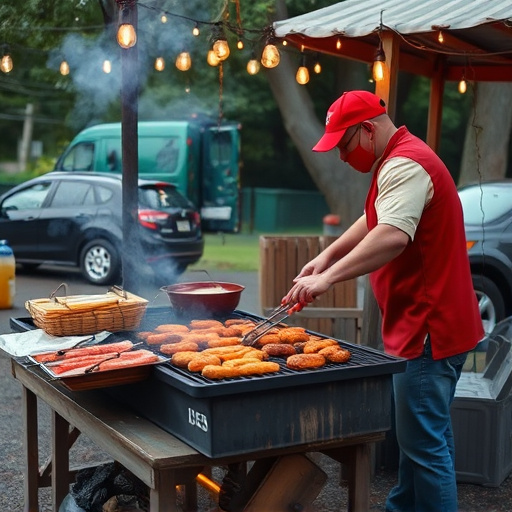
When it comes to achieving perfectly tender and flavorful BBQ ribs, the age-old debate rages on: grill or bake? While both methods have their merits, baking offers a unique advantage for those seeking the ultimate in meat tenderness and intense flavor infusion. Unlike grilling, which relies on direct heat and can lead to tough, dry ribs, baking allows for slow, moist heat to transform your ribs into a tender, succulent delight.
Imagine locking your ribs in an oven, where they slowly cook, allowing the marinades and sauces to deeply penetrate each slice. This gentle approach ensures that your ribs remain juicy and tender, with a mouthwatering crust formed by the caramelization of natural sugars. For those seeking the perfect BBQ ribs in oven recipe, this method is a game-changer, offering consistent results and the chance to experiment with various rubs and sauces to create your signature flavor profile.
Tips for Storage and Reheating Leftover BBQ Ribs
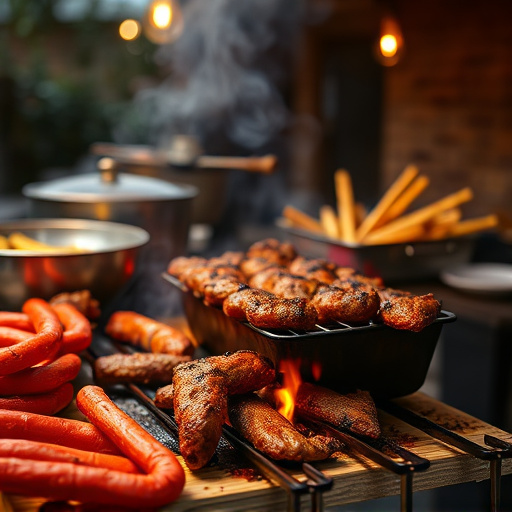
When it comes to storing leftover BBQ ribs, the key is to keep them fresh and prevent drying out. Place the ribs in an airtight container or wrap them tightly in plastic wrap or foil. Store them in the refrigerator for up to 3-4 days. If you’re planning to reheat, it’s best to do so in the oven at a low temperature—around 300°F (150°C)—to maintain moisture.
For a quick BBQ ribs in oven recipe, preheat your oven, remove the ribs from storage, and brush them with barbecue sauce. Place them on a baking sheet or in a baking dish, cover loosely with foil, and bake for approximately 20-30 minutes per pound. Remove the foil to let the sauce caramelize, then broil briefly if needed to achieve that crispy, charred exterior.
